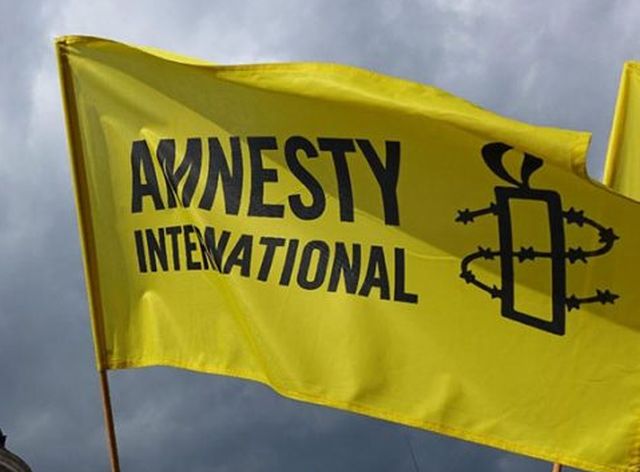
by admin | May 25, 2021 | News, Politics
 New Delhi : Amnesty International on Saturday castigated the Adityanath government in Uttar Pradesh for doing little to ensure justice and rehabilitation for the survivors of the 2013 Muzaffarnagar communal violence.
New Delhi : Amnesty International on Saturday castigated the Adityanath government in Uttar Pradesh for doing little to ensure justice and rehabilitation for the survivors of the 2013 Muzaffarnagar communal violence.
On the fifth anniversary of the deadly riots in Muzaffarnagar district that claimed at least 60 lives and displaced over 50,000 people, the Amnesty International India blamed the state government’s apathy for seven gang-rape survivors still awaiting justice and the displaced continuing to look for rehabilitation.
“The Uttar Pradesh government has forgotten the riot survivors of Muzaffarnagar and Shamli. The state has done very little to redress the injustice they have faced. The government’s attempt at rehabilitation and compensation has been woefully inadequate”, said Asmita Basu, Programmes Director, Amnesty International India.
She said justice remained elusive for the seven gangrape survivors who have received little assistance from authorities to rebuild their lives and livelihoods.
“There has not been even one conviction in any of the seven cases so far. In 2016, one of the survivors died during childbirth,” she said.
Quoting one of the survivors, a mother of five, Amnesty International India said the victims have lost all hope of getting justice and are now hoping for survival of their families.
“Their rapists are out in the open for years now. Women are scared to pursue their cases and they cannot be blamed for this. There are media reports of compromises being made and of money being offered and accepted by many of the seven families. We need to understand the realities in which these women have survived all these years. They are scared and have lost all faith in the system,” said Rehana Adeeb, an activist working with the survivors.
THe rights body said an overwhelming majority of families in resettlement colonies lack access to basic services like clean drinking water and drainage facilities.
“The Uttar Pradesh government’s callous treatment of Muzaffarnagar and Shamli riot survivors is a breach of its commitment to uphold basic constitutional values. The riot survivors have been forced to live in a vicious cycle of poverty and discrimination. The Uttar Pradesh Chief Minister must ensure that the voices of the survivors are heard immediately and justice is delayed no further”, added Basu.
—IANS

by admin | May 25, 2021 | News
 New Delhi : India is among the deadliest countries for defenders of rights related to land, territory, environment, rights NGO Amnesty International said on Tuesday.
New Delhi : India is among the deadliest countries for defenders of rights related to land, territory, environment, rights NGO Amnesty International said on Tuesday.
In its global report ‘Deadly but Preventable Attacks: Killings and Enforced Disappearances of Those who Defend Human Rights’, released on Tuesday, the rights watchdog said: “In India, journalists, land rights activists, and those advocating the rights of ethnic and religious minorities, Dalits and Adivasis (tribal) are among those at risk of attack.”
Among the deadliest countries for this group of human rights defenders are Brazil, Colombia, the Philippines, India and Honduras, it said.
According to an Amnesty release, as many as 3,500 human rights defenders were killed worldwide since 1998 while the number in 2016 was 281– a significant increase from 156 defenders killed in 2015 and 136 in 2014.
Also, 48 journalists were killed worldwide in 2016, according to the Committee to Protect Journalists.
The report included testimonies from human rights defenders as well as their relatives and colleagues in India, Argentina, Brazil, Colombia, Democratic Republic of the Congo, Honduras, Indonesia, Kenya, Mauritania, Mexico, Russia, South Africa, South Sudan and Syria.
Many described how victims’ pleas for protection had been repeatedly ignored by the authorities and how the attackers had evaded justice, fueling a deadly cycle of impunity, it said.
Asmita Basu, Programmes Director at Amnesty International India, said human rights defenders were painted as a threat to development or traditional values.
“Human rights defenders, instead of being recognised and protected by the state, are
portrayed as ‘criminals’, ‘foreign agents’, ‘anti-nationals’ and ‘terrorists’, and painted as a threat to development or traditional values. Such labels are divisive, signal contempt for constitutional rights, and give a green light to further abuses,” she said, as per the release.
The report has brought together stories from around the world including that of journalist Gauri Lankesh, who was fatally shot outside her home in Bengaluru in September 2017.
It also mentioned Chhattisgarh’s Jailal Rathia, who had challenged the Adivasi land grabbing and later died of what was suspected as deliberate poisoning, and killing of Maharashtra Dalit activist Chandrakant Gaikwad.
The report focused on the gravest of violations against human rights defenders– killings and enforced disappearances.
“The motives behind these attacks are multiple and layered. Some people are attacked because of their legitimate activities, for example, as they stand up to powerful actors violating human rights, share information and raise awareness, or confront discriminatory public opinion and social norms. Others are attacked both for what they do and who they are,” it said.
The human rights defenders included those defending the rights of women, lesbian, gay, bisexual, transgender and intersex people and indigenous peoples and minority groups, it added.
—IANS

 New Delhi : Amnesty International on Saturday castigated the Adityanath government in Uttar Pradesh for doing little to ensure justice and rehabilitation for the survivors of the 2013 Muzaffarnagar communal violence.
New Delhi : Amnesty International on Saturday castigated the Adityanath government in Uttar Pradesh for doing little to ensure justice and rehabilitation for the survivors of the 2013 Muzaffarnagar communal violence.
